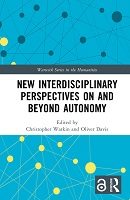Chapter 5 Autonomy and autoheteronomy in psychedelically assisted psychotherapy
Proposal review
Abstract
Psychedelically-enhanced psychotherapy (PAP) looks set to become a common remedy for a range of serious mental health problems. The market for providing PAP, including a secondary market for the training, credentialising and monitoring of therapists, is expanding rapidly. Concerns have been raised recently by actors in that secondary market about the potential for abuse in PAP, which have been framed in terms of a failure to respect patient autonomy. Such concerns cannot be adequately addressed without a fundamental reconsideration of the role of autonomy in psychotherapy. Discussing what autonomy means in psychotherapy and thence especially in PAP is the aim of this chapter, which starts from practitioner-focused guidance, before reflecting on the history of autonomy in geopolitics and ethics and finally returning to consider its place in psychotherapy generally and PAP specifically. The conclusion reached is that while protecting autonomy is the primary concern of medical ethics today, autonomy is not equal to the phenomenology of the psychedelic experience, which is better characterised in terms of ‘autoheteronomy’. The chapter’s contribution to the emerging ‘psychedelic humanities’ is to show that PAP brings to crisis longstanding cultural compromises and uncertainties around the way in which psychotherapy has been thought to foster patient autonomy.
Keywords
Autonomy, philospohy, politics, language, Pharmacology, climateDOI
10.4324/9781003331780-8ISBN
9781032364070, 9781032364094, 9781003331780Publisher
Taylor & FrancisPublisher website
https://taylorandfrancis.com/Publication date and place
2023Grantor
Imprint
RoutledgeClassification
Literature: history and criticism
Political ideologies and movements
Social and cultural anthropology
Social discrimination and social justice


 Download
Download